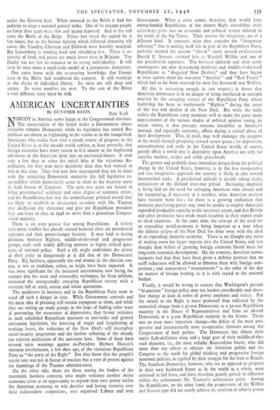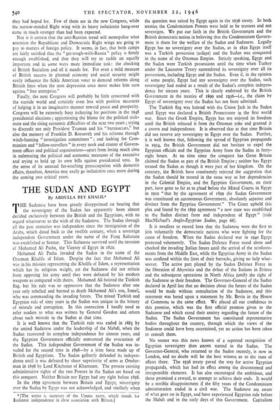AMERICAN UNCERTAINTIES
NOBODY in America seems happy at the Congressional elections. The uncertainties of the future under a Government whose executive remains Democratic while its legislative has turned Re- publican are almost as frightening to the victors as to the vanquished. Americans who realise how vital a steady course of progress in the United States is to the outside world confess, at least privately, that foreign countries have every reason to feel uneasy at the haphazard adventure of the American giant into an uncharted future. It took only a few days to sober the initial bliss of the victorious Re- publicans, for they won more decisively than they had wanted to win at this time. They feel now how unprepared they are to share with the remaining Democratic executive the full legislative re- sponsibility which prematurely came to them as the majority party in both houses of Congress. The next two years are bound to bring governmental stalemate and some degree of economic crisis ; and the Republicans fear that the unsatisfactory political record they are likely to establish as involuntary co-rulers with Mr. Truman may disillusion the electorate and give the Republican president they can hope to elect in 1948 no more than a precarious Congres- sional majority.
There is an even greater fear among Republicans. A violent inter-party conflict has already started between their six presidential aspirants and their power-hungry factions. It may lead to lasting divisions between Rightist, middle-of-the-road and progressive groups, each with widely differing answers to highly critical ques- tions of national policy. Such a rift might undermine the power of their party as dangerously at is did that of the Democratic Party. Big business, apparently the real winner in the election con- test, is not as confident, either, as might have been expected. It was most significant for the increased uncertainties now facing the country that the stock and commodity exchanges, far from jubilant, answered the unexpectedly sweeping Republican victory with a resonant fall of stock, cotton and wheat quotations.
The moderates in business and in the Republican Party want to ward off such a danger in time. While Government controls and the mere idea of planning still remain repugnant to them, and while they are setting up study groups in the hope of finding other ways of preventing the recurrence of depressions, they favour reticence in such scheduled Republican measures as anti-strike and general anti-union legislation, the lowering of wages and lengthening of working hours, the reduction of the New Deal's still incomplete social-security programme and the further softening of the already too tolerant application of the anti-trust laws. Some of them have uttered open warnings against ex-President Herbert Hoover's ominous proclamation, a few days ago, of the victorious Republican Party as " the party of the Right." For they know that the people's recent vote was not in favour of reaction but a vote of protest against the fumblings of the Truman administration.
On the other side, there are those among the leaders of the mammoth business concerns who might welcome another major economic crisis as an opportunity to expand their own power within the American economy, to win decisive and lasting victories over their independent competitors, over organised Labour and over Government. When a crisis comes, therefore, they would have strong-handed Republicans of the utmost Right consolidate their crisis-born gains into an economic and political system tailored to the needs of the big Trusts. Their reasons for misgivings are of a different kind. It concerns what they consider the "dangerous softening " that is making itself felt in part of the Republican Party, probably beyond the narrow " liberal " circle around ex-Governor Harold E. Stassen, spiritual heir to Wendell Willkie and one of the presidential aspirants. The business diehards and their party counterparts are now denouncing moderate and middle-of-the-road Republicans as " disguised New Dealers," and they have begun to raise against them the war-cries " Socialist " and "Red Fascist " which had so far been reserved for men like Roosevelt and Wallace.
All this is reassuring enough in one respect ; it shows that American democracy is in no danger of being smothered in outright reaction by the sweeping victory of the Republican Party whose leadership has been so vociferously " Rightist " during the years of the rise and decline of the New Deal. But while the strife within the Republican camp promises well to make the party more representative of the various shades of political opinion among its
recent voters, it also presages extreme instability in America's internal, and especially economic, affairs during a critical phase of their development. This, in itself, may well endanger the progress of the world through prosperity toward secure peace ; for depression, unemployment and strife in the United States would, of course, greatly affect a world that is dependent upon America not only for supplies markets, credits and stable price-levels.
The greater and probably more immediate danger from the political change in the United States, however, is in the less co-operative and less imaginative approach the country is likely to take toward international trade. A paradoxical attitude is already taking shape, reminiscent of the ill-fated inter-war period. Increasing emphasis is being laid on the need for enlarging American sales abroad and for recapturing, if necessary at a sacrifice, what American markets have recently been lost ; for there is a growing realisation that domestic purchasing-power may soon be unable to employ America's expanded productive capacity to the necessary extent, and that Britain and other producers have made much headway in their export trade to third countries. At the same time, the concept of the need for an expanding world-economy is being forgotten at a time when the definite eclipse of the New Deal has done away with the ideal of an expanding domestic economy. There is no thought any more of making room for larger imports into the United States, and less thought than before of granting foreign countries liberal loans for long-term economic deveolpment. On the contrary, American manu- facturers feel that they have been given a definite promise that no tariff reductions will be allowed to threaten them with foreign com- petition ; and conservative " retrenchment " is the order of the day on matters of foreign lending, as it is with regard to the national budget.
Finally, it would be wrong to assume that Washington's present " bi-partisan " foreign policy may not harden considerably and there- fore change at least in terms of power emphasis and tactics. For the switch to the Right is more profound than indicated by the numerical change from a 47-seat Democratic to a 31-seat Republican majority in the House of Representatives and from an r8-seat Democratic to a 3-seat Republican majority in the Senate. There was an even more important change—the defeat of the most pro- gressive and internationally most co-operative elements among the Congressmen of both parties. The Democrats lost almost their entire Left-of-Centre wing and a large part of their middle-of-the- road elements, i.e., the most reliable Rooseveltian forces, who did more than any others to educate the American public and the Congress to the needs for global thinking and progressive foreign economic policies, as typified by their struggle for the loan to Britain. The Southern Democrats, however, who are as opposed to progress in their own backward States as in the world as a whole, were returned in full force, and have therefore greatly gained in influence within the unfortunate Mr. Truman's unfortunate party. Among the Republicans, on the other hand, the progressives of the Winkle and Stassen type did not nearly achieve the position of relative power they had hoped for. Few of them are in the new Congress, while the narrow-minded Right wing with its heavy isolationist hang-over came in much stronger than had been expected.
Nor is it certain that the anti-Russian trend will monopolise what attention the Republican and Democratic Right wings are going to pay to matters of foreign policy. It seems, in fact, that both camps are fairly satisfied that the " get-tough-with-Russia " policy is firmly enough established, and that they will try to tackle an equally important and in some ways more immediate task: the checking of British Socialism and all it stands for. For even a mild measure of British success in planned economy and social security might easily influence the fickle American voter to demand reforms along British lines when the next depression once more makes him turn against " free enterprise."
Finally, the next Congress will probably be little concerned with the outside world and certainly even less with positive measures of helping it in an imaginative manner toward peace and prosperity. Congress will be extremely busy jockeying for positions in the 1948 presidential elections ; apportioning the blame for the political stale- mate and the rising economic difficulties of the next two years ; trying to discredit not only President Truman and his " bureaucrats," but also the memory of Franklin D. Roosevelt and his reforms through witch-hunting " investigation committees " ; and looking for Com- munists and "fellow-travellers" in every nook and cranny of Govern- ment offices and political organisations—apart from losing much time in stalemating the political and economic measures of the executive and trying to hold up its own bills against presidential veto. In the sense of its unusual far-reaching preoccupation with domestic affairs, therefore, America may easily go isolationist once more during the coming two critical years.



































 Previous page
Previous page